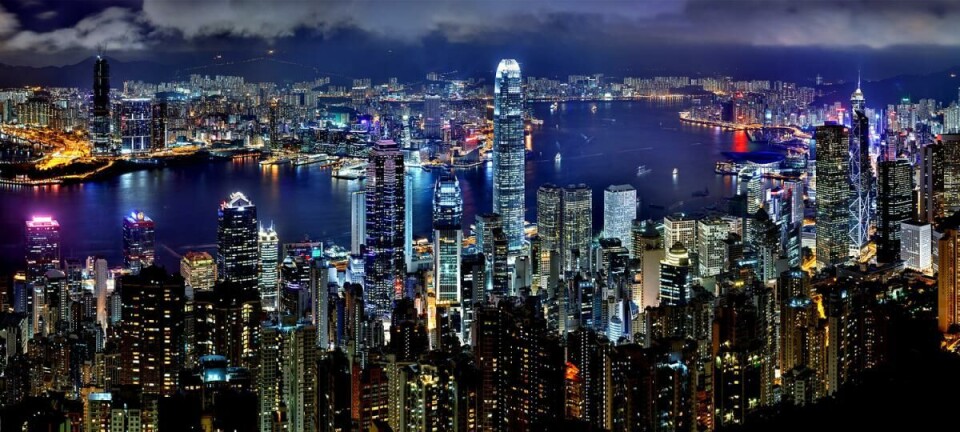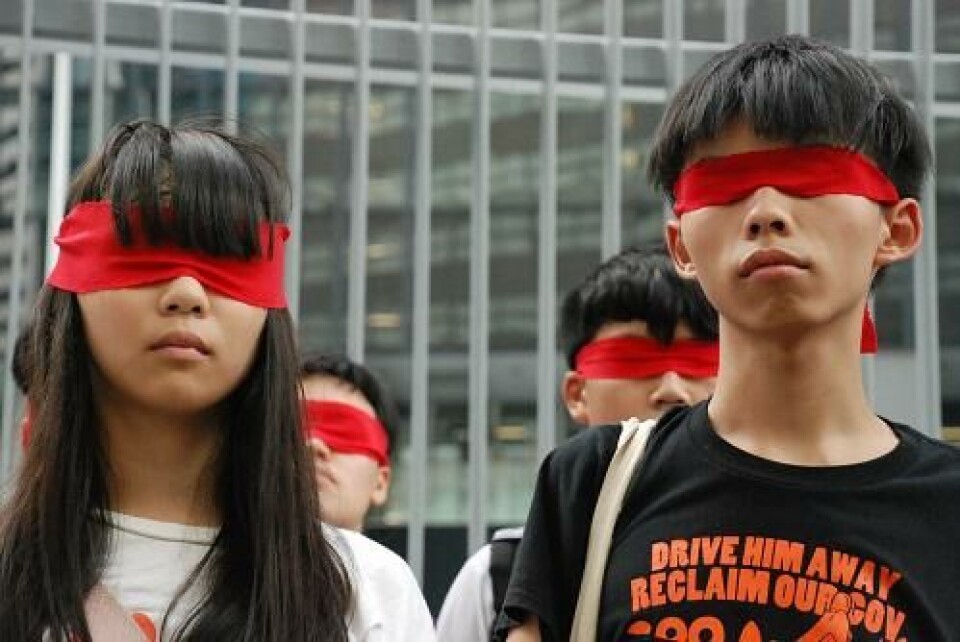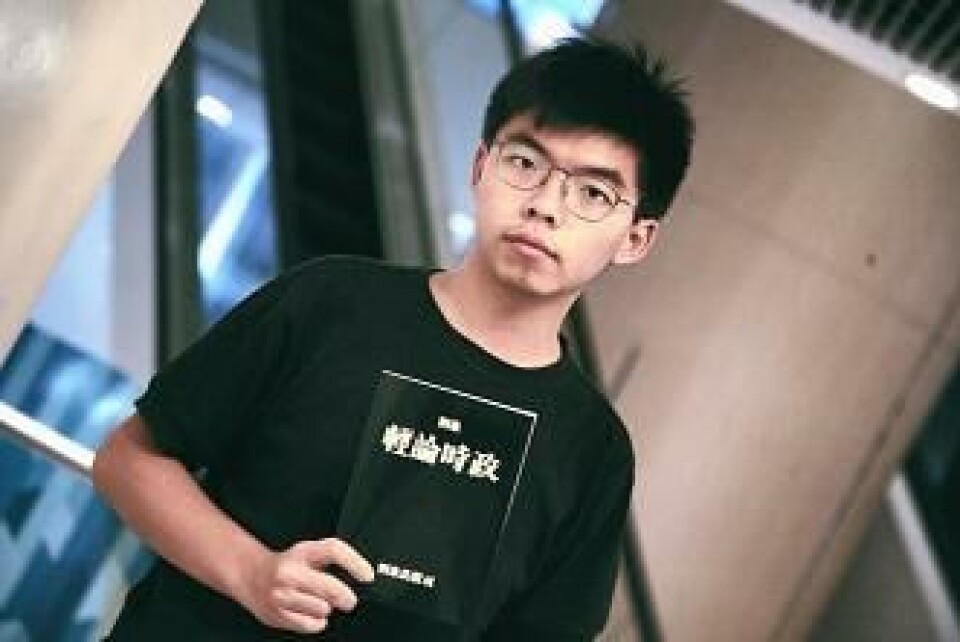article> Spotlight!
What’s Wong in Hong Kong

Just one single law (or more accurately, the amendment on a previous law) instigated the already more than four month-long raging protest movement in Hong Kong. How have things escalated this badly?
by Pieter Jespers
International Section Editor of Veto
Written & Published in Collaboration with Veto
Fugitive Offenders Ordinance
Hong Kong had been a colony of the United Kingdom ever since the Treaty of Nanking (1842), after which it became a part of the People’s Republic of China, following the Sino-British Joint Declaration of 1997. Hong Kong would sustain its socio-economic and judicial institutions for the coming fifty years. Through this arrangement it retained the capacity to sign its own extradition treaties, which it has done with twenty countries thus far, including the United Kingdom, the United States, and neighbouring countries such as the Philippines and Singapore.
When countries ask for extradition, the (non-democratically elected) Chief Executive or governor of Hong Kong (Carrie Lam) can call for a warrant following the Fugitive Offenders Ordinance and Mutual Legal Assistance in Criminal Matters Legislation, but only if the crime under scrutiny is also regarded as such in the judicial order of Hong Kong, and doesn’t concern a political affair.
However, the country asking for extradition cannot apply the death penalty to a Hong Kong citizen, meaning that China, as well as Taiwan, cannot partake in such treaty with Hong Kong. The extradition law introduced on the 13th of March 2019 would have arranged for the same procedure as described in the Fugitive Offenders Ordinance to be applicable to countries with which no extradition treaty had been signed - albeit on a case-by-case basis - for which the Chief Executive could only send in a temporary request for arrest, which could be contested in court before coming into effect.
Contrary to the customary situation in the past - when the Chief Executive could only discretionarily instigate extradition to a country for which the court order was trusted a priori - the population is now fearing that every citizen can be extradited to a state, even if its court order allows for capital punishment, as is the case with China.
The summer of defiance
On the 9th of June the first protest broke out. According to demonstrators there were one million protesters, but the police spoke of just 240 000. Nevertheless, Chief Executive Carrie Lam announced that a second reading of the law would proceed, after which the crowd stormed the building of the Legislative Council. Three days later, the demonstrators blocked access to the building to disrupt this second reading.
For the first time since the transfer of Hong Kong to China, violence broke out between the public and the police, with 79 injured as a consequence.
Lam denounced the peaceful protests as ‘organised riots’, which implied that those arrested could be prosecuted and jailed for 10 years. On the 15th of June, the law was suspended indefinitely, however the following day a subsequent march took place regardless.
On the 1st of July, the demonstrators occupied the Parliament building, vandalised the emblem of the Special Administrative Region of Hong Kong, and hung the colonial flag over the Speaker’s chair. Three weeks later, the masses first turned openly against the Chinese government by invading the Liaison Office, the representation of China in Hong Kong.
That same night, masked men in white T-shirts appeared in Yuen Long - the underground subway station - to attack demonstrators, but also random passengers, with bamboo sticks and batons. The police arrived surprisingly late to arrest the perpetrators. On the 27th of July some activists discovered a car with bamboo sticks inside - similar to those used at the event in Yuen Long - but also delivery notes addressed to an employee at the Liaison Office. Beijing denies the accusations.
Meanwhile, state officials, bound to neutrality and non-participation with the protests, dropped out of work. After heavy clashes in the airport on the 12th of August and weeks of protest, Beijing announced on the 3rd of September that a state of emergency would be declared. Beijing also consciously pushed through a principle that no concessions would be granted towards any of the protesters’ demands.
However, unexpectedly, Lam announced the withdrawal of the extradition bill.
Nicolas Standaert, historian and sinologist at the KU Leuven regards it as a remarkable fact: “Such a decision is naturally not taken without Beijing, and the fact that they buried the law is highly remarkable. This is really something new, something you cannot underestimate in the process. I can imagine that some demonstrators are now saying: 'that’s enough protesting'. And so some have reached their breaking point now that the primary cause for the crisis – the extradition bill – has effectively been buried.”
“The young people want something far more. They want more democracy. That does not just refer to the local parliaments, but also those in the districts. One of the analyses in the South China Morning Post points to the fact that in all steps of the process surrounding the decision in favor of the extradition bill, the districts were being involved far too little. Carrie Lam has said in one of her responses that she’ll have more respect for the districts in future.”
Youth for democracy
A survey taken by the director of the School of Journalism and Communication Francis Lee, Gary Tang (Hang Seng University), Edmund W. Cheng (Hong Kong Baptist University) and Samson Yuen (Lignan University) points out that approximately three-quarters of the demonstrators have a diploma of higher education and 60% are under the age of 30 years.
Student-led protests also have a long tradition in Hong Kong. In 1989, people first turned up on the streets in solidarity with the protests on Tiananmen Square, Beijing. The Hong Kong Federation of Students, a trans-universitary student trade union, held fundraisers for their student-colleagues on the mainland. Also, in 2003 and 2012, people gathered together to impede legislation that would hand over more power to Beijing.
In 2014, the youth organised the largest strike thus far in the so called Umbrella Movement, a raging protest lasting 79 days. As a manifestation of civil disobedience they blocked the main streets of the communality of Hong Kong and coloured the landscape with all of the colours of the spectrum in protection from the use of water canons and tear gas by the police.
Student leaders like Joshua Wong and Agnes Chow became famous internationally for their courageous resistance.

Agnes Chow and Joshua Wong on the 23rd of September 2014 wearing red blindfolds to symbolize how students are blinded by China's political power.
Wong is a veteran of the democratic movement, despite only being 23 years old. He has participated in protests against the increasing Chinese influence on Hong Kong since he was fourteen. He’s also the co-founder and current secretary-general of the democratic youth movement Demosisto (2016) and has become regarded as the face of this movement on the international forum, though in principle it remains leaderless. Wong wrote and still writes columns for the New York Times, the South China Morning Post and The Guardian, including while he was still in prison two years ago. He knows the prisons and the increasingly growing arm of Beijing in the safety policy of Hong Kong all too well due to his activism. More than once he’s been arrested and beaten.

Joshua Wong in 2019
Agnes Chow appears often at the side of Wong. Just like him, she was a participant in the protests of 2012 and 2014. Similarly she’s still on the board committee of Demosisto, the movement that she founded together with him and the previous secretary-general Nathan Law. Chow ran for the parliamentary elections last year, but couldn’t participate as a candidate because the electoral commission ruled Demosisto was pleading for self-determination, which is in contradiction to the Basic Law that says that Hong Kong is a part of China. Starting this month, the court in Hong Kong ruled the decision invalid, since the commission didn’t offer Chow a chance at further explaining her political views before taking a decision in the case.

Agnes Chow in 2017
Crusade in jeans
One of the special aspects of the protest - mentioned but not elaborated by Belgian media - is the visible presence of Christians during the protests. That’s why “Sing Hallelujah to the Lord” is one of the unexpected chants in the plea for more democracy. It’s hard to say how many Christians participate, just as it is hard to point out whether or not they use it as an inspiration in their democratic crusade.
Yet, many of them do put forward their religion when they walk in these marches. A notable example is Chow, who says she draws her inspiration for her social engagement from her Catholic upbringing. Wong has also repeatedly stated that his efforts in favour of society originated from his Protestant (Lutheran) conviction and his zeal for a more just society.
“For me, the teaching of Christianity has laid a good foundation to be concerned about elderly people who live alone, and many other social justice issues. The church has also had a big impact on my organizational capacity. Every Christmas and Easter there are large-scale activities, parties, shows and cell groups. When I was a senior high student, I had to lead junior high students in Bible classes. I learned how to lead small group meetings and games, as well as public speaking.”
On the 19th of June 2019, the cardinal of Hong Kong, John Tong Hon, and the pastor and apostolic administrator of 21 churches, Eric So Shing-Yit, jointly called on the government to withdraw the bill and to instigate an independent police inquiry. In the Umbrella Movement of 5 years ago there were devout Christians too, including leaders of the protest such as Bishop Chu Yiu-Ming.
Ever since those days, the crowd learned from its previous mistakes: today they behave as if they were water - the masses do not stand still but flow throughout the city to stay out of contact with the authorities.
Insta-stalemate
The digital age brought us social media and this in turn made revolutions gain momentum. Just think of the Arab Spring and how Facebook brought the crowd together at Tahrir Square in Egypt. Think of how the blue profile picture of Instagram and Twitter is a demonstration of solidarity with the protests in Sudan, and of how different applications make a quarter of the Hong Kong population march through the streets of the city. Those apps bring demonstrators in contact with one another to keep them out of the hands of the police in a fluid and ever-shifting way (“Be water!”), but also indicate where and when there are protests taking place.
Standaert looks at it in the following way: “The digital space can be abrogated, like the People’s Republic of China is doing. But you can mobilise people through it as well. Yet, it refrains from establishing compromise. When we’re talking about democracy in Hong Kong and you tell people: ‘It has to be universal suffrage at once’, then you’re not going to succeed in any way. You should try to negotiate the direct election of seats in parliament and try to raise the number. But if everyone brings out his/her opinion online, then you won’t have a small delegation of people who are prepared to compromise with the ruling powers to reach their goal.”
Thomas Friedman, an American journalist specialized in foreign affairs, played on this hypothesis earlier in his analysis, in an opinion piece for the New York Times (17/09/19):
“Because there is no leadership, there is no ability to cut a deal, and anyone who tries to compromise will get torched online. These modern movements are crowd-sourced but also crowd-enforced, and that’s intimidating for anyone who wants to make a deal.”
“Worldwide trends usually take a few years to reach Hong Kong,” wrote Alex Lo, a columnist for the South China Morning Post, and “our social media-driven revolution that has fueled the current unrest is no exception … But from Gezi Park in Istanbul to Tahrir Square in Cairo, revolutions and rebellions driven by social media have all ended in failure.”
The previous big protest movement, the Umbrella Movement, ironically broke out in September after Beijing had announced that the population could choose its own leaders, although they could only choose from a list composed of candidates selected by Beijing in advance. Albeit far from a fully-fledged democracy, it was a huge step forward in comparison to the Beijing-loyal commission of 1200 voters that had nominated the Chief Executive in the past.
In the present case each citizen would be able to vote for the most democratic candidate. The compromise was rejected by the street and with it the opportunity of more democracy led to nought.
Or as Thomas Friedman states: “I have huge admiration for the courage of Hong Kongers to defend their city’s unique character. But my head says that ‘perfect’ is rarely on the menu and that better is good when facing an overwhelming power like Beijing. Imagine that the Aug. 31, 2014, compromise had been accepted. Mainland Chinese would be watching Hong Kongers vote directly for their leaders — albeit from a limited list — compared with mainlanders who can’t do even that.”
Five Demands
Former leaders of the democratic movement in Hong Kong such as Martin Lee, ‘the father of democracy’, are backing the protest. He founded the democratic movement in Hong Kong during the end of the 80s and the beginning of the 90s, and is also a devout Christian (Catholic) just like Wong and Chow.
He points out that two of the five demands are crucial: the withdrawal of the bill (which has now happened) and the independent inquiry into the protest and the use of violence. About these two demands there exists the most consensus, even for more conservative Beijing-followers. According to him, there’s no great adherence to the idea of independence, because most people know that it is not within reach. They do want more democracy (universal suffrage), which was promised to them in the Sino-British Joint Declaration of 1997. The Basic Law said that they would have it within ten years, but in the meantime, 23 years have passed without result.
The five demands are:
The withdrawal of the bill, the independent inquiry into the protest and the use of violence, the resignation of Carrie Lam, the release of everyone who’s been arrested during the protests and the recognition that these were protests, not riots (that are punishable), and ultimately: democratic elections.
What now?
“I believe in any case that the People’s Republic won’t take big steps forward in the process of more democratic rights. They fear that the ‘chaos’ might spread onto the Chinese mainland. I do find it important that we do not speak of Beijing as a unified whole, because you see that inside government circles, there exists a variation of viewpoints”, according to Standaert. “There certainly are policymakers that propose radical solutions and, in other words, want the preparation of military forces for a display of power and even advocate military intervention. But there are also others that are much more moderate, especially with the upcoming seventieth birthday of the People’s Republic on the 1st of October. You’ve got the impression that for the moment the moderates have won.”





